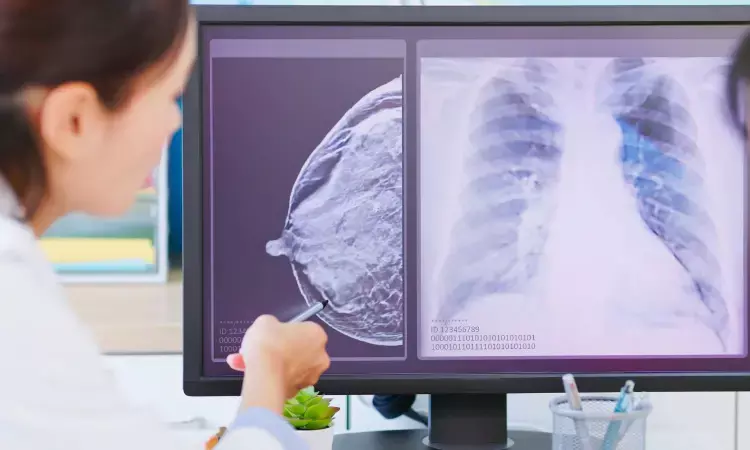- Home
- Medical news & Guidelines
- Anesthesiology
- Cardiology and CTVS
- Critical Care
- Dentistry
- Dermatology
- Diabetes and Endocrinology
- ENT
- Gastroenterology
- Medicine
- Nephrology
- Neurology
- Obstretics-Gynaecology
- Oncology
- Ophthalmology
- Orthopaedics
- Pediatrics-Neonatology
- Psychiatry
- Pulmonology
- Radiology
- Surgery
- Urology
- Laboratory Medicine
- Diet
- Nursing
- Paramedical
- Physiotherapy
- Health news
- Fact Check
- Bone Health Fact Check
- Brain Health Fact Check
- Cancer Related Fact Check
- Child Care Fact Check
- Dental and oral health fact check
- Diabetes and metabolic health fact check
- Diet and Nutrition Fact Check
- Eye and ENT Care Fact Check
- Fitness fact check
- Gut health fact check
- Heart health fact check
- Kidney health fact check
- Medical education fact check
- Men's health fact check
- Respiratory fact check
- Skin and hair care fact check
- Vaccine and Immunization fact check
- Women's health fact check
- AYUSH
- State News
- Andaman and Nicobar Islands
- Andhra Pradesh
- Arunachal Pradesh
- Assam
- Bihar
- Chandigarh
- Chattisgarh
- Dadra and Nagar Haveli
- Daman and Diu
- Delhi
- Goa
- Gujarat
- Haryana
- Himachal Pradesh
- Jammu & Kashmir
- Jharkhand
- Karnataka
- Kerala
- Ladakh
- Lakshadweep
- Madhya Pradesh
- Maharashtra
- Manipur
- Meghalaya
- Mizoram
- Nagaland
- Odisha
- Puducherry
- Punjab
- Rajasthan
- Sikkim
- Tamil Nadu
- Telangana
- Tripura
- Uttar Pradesh
- Uttrakhand
- West Bengal
- Medical Education
- Industry
Longitudinal Changes in Breast Density may predict subsequent Breast Cancer Risk: JAMA

USA: A new study published in JAMA: Oncology has found that evaluating longitudinal change in breast density from digital mammograms could be a predictor for assessing subsequent breast cancer risk.
Breast cancer is one of the most common forms of cancer among women worldwide, and early detection is key to successful treatment. While breast density has been established as a risk factor for breast cancer, further research is needed about the longitudinal changes in breast density over time and whether these changes are associated with an increased risk of developing breast cancer.
The study conducted at Joanne Knight Breast Health Cohort, St Louis used a nested case-control cohort design that observed over 10,481 women from 2008 to 2020 and identified 289 cases of breast cancer.
Breast density was measured via routine screening mammograms every 1-2 years, and changes in volumetric breast density over time were assessed. Additionally, breast cancer risk factors were collected through questionnaires at enrollment, and breast biopsy pathology confirmed cancer diagnoses.
The study revealed the following clinical takeaways:
1. The mean interval between the last mammogram and subsequent breast cancer diagnosis was 2.0 years.
2. Breast density decreased over time in both cases and controls.
3. The rate of decline in breast density was significantly slower in the breast that developed cancer compared to controls.
4. The estimate for the slower decline was 0.027, the rate of breast density decrease was slower in the breast that developed cancer compared to controls.
Mammography is the most commonly used screening tool for breast cancer, but its accuracy can be affected by factors such as breast density. The findings of this study could lead to more effective screening and prevention strategies for women at higher risk of developing breast cancer.
However, more research is needed to confirm the findings of this study and to determine how best to incorporate longitudinal changes in breast density into existing risk models.
Reference:
Jiang S, Bennett DL, Rosner BA, Colditz GA. Longitudinal Analysis of Change in Mammographic Density in Each Breast and Its Association With Breast Cancer Risk. JAMA Oncol. Published online April 27, 2023. doi:10.1001/jamaoncol.2023.0434
Dr. Mahalakshmi Sivashankaran joined Medical Dialogues as an Intern in 2023. She is a BDS graduate from Manipal College of Dental Sciences, Mangalore Batch 2022, and worked as a Junior Resident at VMMC & Safdarjung Hospital at the Department of Dental Surgery till January 2023. She has completed a Diploma in Executive Healthcare management from the Loyola Institute of Business Administration, developing skills in Healthcare Management and Administration. She covers several medical specialties including Dental, ENT, Diagnostics, Pharmacology, Neurology, and Cardiology.
Dr Kamal Kant Kohli-MBBS, DTCD- a chest specialist with more than 30 years of practice and a flair for writing clinical articles, Dr Kamal Kant Kohli joined Medical Dialogues as a Chief Editor of Medical News. Besides writing articles, as an editor, he proofreads and verifies all the medical content published on Medical Dialogues including those coming from journals, studies,medical conferences,guidelines etc. Email: drkohli@medicaldialogues.in. Contact no. 011-43720751


